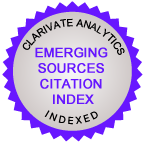De prácticas y representaciones. Notas para investigación(es) de la cultura.
-
Diego A. Moreiras
 diegoamoreiras@yahoo.com.ar
diegoamoreiras@yahoo.com.ar
Downloads
Abstract
La primera parte de este trabajo tiene como meta recuperar algunos de los conceptos que a lo largo de la historia de la teoría y teóricos marxistas han debido ser reconceptualizados. Buscaremos superar el economicismo que se le atribuye al marxismo o a algunos marxistas permaneciendo, sin embargo, dentro de la problemática del materialismo histórico (Mouffe, 1979: 84): en definitiva, buscaremos dar cuenta de las posibilidades de una teoría marxista de la cultura recuperando los planteos de Raymond Williams (1980, 1981). La segunda parte de este trabajo (...) considera los aportes que la teoría de los discursos sociales de Eliseo Verón (1987, 2002) ha realizado en el campo de la Semiótica, atendiendo a las disputas (...) que, “dicha teoría”, busca responder. En este recorrido, buscaremos configurar un campo de preocupaciones comunes para las teorías williamsiana de la cultura y veroniana de los discursos. Estas confluencias serán los principales aportes de este trabajo, que buscarán, con la Semiótica como trasfondo, configurarse como recaudos y recomendaciones teórico – metodológicos para la investigación de fenómenos socio – culturales.Palabras Clave
APPLE, Michael. 1987. Educación y poder. Madrid: Paidós-MEC.
DALMASSO, María Teresa. 2005. Reflexiones semióticas. En Revista Estudios Nro. 17 Córdoba: Centro de Estudios Avanzados, Universidad Nacional de Córdoba. Págs. 13–20.
DE IPOLA, Emilio. 2002. Discurso social. En ALTAMIRANO, C. (director). Términos críticos de sociología de la cultura. Buenos Aires: Paidós.
MARX, Carlos. & ENGELS, Federico. 1977. Obras escogidas. Carta de Engels a Bloch. Madrid: Editorial Fundamentos. Págs. 520– 523.
MENÉNDEZ, Eduardo. 2002. La parte negada de la cultura. Barcelona: Ediciones Bellaterra. Introducción y capítulos 1 y 5.
MOUFFE, Chantal. 1979. Hegemony and ideology. En MOUFFE, C. Gramsci and marxist theory. London: Routledge & Kegan, (sin datos de la versión en español).
PORTELLI, Hugues. 1973. Gramsci y el bloque histórico. Buenos Aires: Siglo XXI. Introducción y Caps. 1, 2 y 3.
SHARP, Rachel. 1988. Conocimiento, ideología y política educativa. Madrid: Ediciones Akal. Págs. 23–30.
VERÓN, Eliseo. 1987. La Semiosis Social. Fragmentos de una teoría de la discursividad. Barcelona: Gedisa.
VERÓN, Eliseo. 2002. Signo. En ALTAMIRANO, C. (director). Términos críticos de sociología de la cultura. Buenos Aires: Paidós.
WILLIAMS, Raymond. 1980. Marxismo y Literatura. Barcelona: Ediciones Península. Partes 1 y 2.
WILLIAMS, Raymond. 1981. Cultura. Sociología de la Comunicación y del Arte. España: Paidós Comunicaciones. Caps. 1, 7 y 8.
Similar Articles
- Montserrat Vidal-Mestre, Alfonso Freire-Sánchez, Maria Fitó-Carreras, The journalistic discourse and the elements of message transmission in the podcast and the audiovisual docuseries of true crime. The case of El asesino de la baraja , Perspectivas de la Comunicación: Vol. 17 (2024): January - December
- Baal Ulises Delupi, Carnival, all my life! Artivistic Resistance Speeches in Barcelona: The Case of Enmedio , Perspectivas de la Comunicación: Vol. 15 No. 1 (2022): January - June
- Natalia Raimondo Anselmino, Alejandro Sambrana, Ana Laura Cardoso, José Rostagno, Paratextual and paralinguistic resources in the fanpages of the Argentine newspapers Clarín and La Nación. Attributes of press discourse in social networking sites , Perspectivas de la Comunicación: Vol. 12 No. 2 (2019): July - December
- Teresa Velázquez García-Talavera, Marta Rizo García, The discourse of the far right and the crucial moments of political life , Perspectivas de la Comunicación: Vol. 18 (2025): (Publishing on a rolling basis)
- Francisco Javier Alonso-Flores, Carolina Moreno-Castro, Antonio Eleazar Serrano-López, Researchers‘ age, gender and professional status as indicators of the Twitter perception in science dissemination , Perspectivas de la Comunicación: Vol. 12 No. 1 (2019): January - June
- María Angulo Egea, Construction of the discourse on the crisis: the evicted people. Analysis of reports and biographical sketches (2012-2015) , Perspectivas de la Comunicación: Vol. 11 No. 1 (2018): january - august
- Eduardo Raíces, From the secret Argentina to youth emergence. Cultural analysis and politics in the Peronist magazine Línea (1980-1982) , Perspectivas de la Comunicación: Vol. 13 No. 2 (2020): July-December
- Jorge Manrique-Grisales, David González Cruz, Walter Federico Gadea Aiello, Submission and autonomy: political commitment in the early days of journalism in Colombia and Ecuador , Perspectivas de la Comunicación: Vol. 17 (2024): January - December
- Jose Luis Piñuel Raigada, Enrique Morales Corral, A praxeological study of research in communication, through analysis of the hegemonic discourse of academic researchers in Spain [Bilingual edition: Spanish – English] , Perspectivas de la Comunicación: Vol. 11 No. 2 (2018): September - December
- Yonathan A. Escobar Arboleda, Review - Political Discourse as Dialogue. A Latin American Perspective. Oxford, UK: Routledge, 2018. 216 páginas. ISBN 978-1-138-67878-1. , Perspectivas de la Comunicación: Vol. 11 No. 2 (2018): September - December
1 2 3 4 5 6 7 8 9 10 11 12 > >>
You may also start an advanced similarity search for this article.
Downloads
Published
How to Cite
Issue
Section
License
- Proposed policy to offer Open Access Journals
Authors who publish with this journal agree to the following terms:
a) Authors retain copyright and grant the journal right of first publication with the work simultaneously licensed under a Creative Commons Attribution Attribution (CC -BY 4.0) ![]() that allows others to share the work with an acknowledgement of the work's authorship and initial publication in this journal.
that allows others to share the work with an acknowledgement of the work's authorship and initial publication in this journal.
b) Authors are able to adopt licensing agreements for the non-exclusive distribution of the journal's published version of the work (for example, to post it to an institutional repositories or publish it in a monograph), with an acknowledgement of its initial publication in this journal.
c) Authors are allowed and encouraged to post their work online (For example, in institutional repositories or on their website) prior to and during the submission process, as it can lead to productive exchanges and increase the citation of published work (See The Effect of Open Access).











